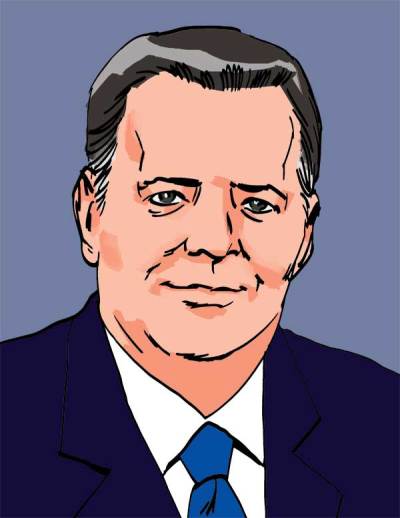Aborting Down Syndrome Babies Isn't Progress, It's Eugenics

Today, March 21, 2018, is "World Down Syndrome Day" where the international community recognizes and expresses appreciation for the millions of our fellow human beings who have Down syndrome.
Last week John Franklin Stephens, a young man with Down syndrome, addressed the United Nation's Human Rights Council in Geneva and delivered a powerful and emotional plea for recognition of his and his fellow Down syndrome people's humanity.
I do not know how John Franklin Stephens could have given a more eloquent or poignant speech.
He declared, "I am a man with Down syndrome and my life is worth living. See me as a human being, not a birth defect, not a syndrome. I don't need to be eradicated. I don't need to be cured. I need to be loved, valued, educated, and sometimes helped."
For the record, Down syndrome is a genetic disorder. Typically, this genetic condition is associated with characteristic facial features, delayed physical growth, and moderate to mild intellectual disability.
In recent decades, with legalized abortion on demand, there has been an unrelenting attack on Down syndrome or potential Down syndrome babies, with countries like Iceland seeking to eliminate the birth of even potential Down syndrome babies, and to call it "progress" and improving the health of the nation.
Back in the Clinton administration, by the clear judgment of God, a despicable and profane woman named Dr. Jocelyn Elders served as Surgeon General (1993-1994). In that role she gave testimony before Congress asserting that amniocentesis (in utero testing to seek to identify potential Down syndrome babies) had improved the health of the nation by reducing (i.e., aborting) potential Down syndrome babies. Dr. Elders should have given that testimony with a German accent or at least a Sieg Heil or two (more about that later).
Mr. Stephens testified that "a life with Down syndrome can be as full and exciting as any other."
He then argued that "a world without people like me would be a poorer world, a colder world, a less happy world."
Shrewdly, Stephens then marshaled arguments for how the rest of society benefits from welcoming Down syndrome people in their midst rather than exterminating them. Sadly, it never hurts to make the utilitarian appeal to self-interest in the extremely pragmatic current American context.
First, Stephens points out that Down syndrome individuals are a "genetic gift" to society. Down syndrome people's genetic anomaly makes them "a blueprint for medical research in areas that include soft tissue cancer, heart disease, immune system disorders, and Alzheimer's disease."
Second, Stephens argued that Down syndrome individuals are an "unusually powerful source of happiness." He cites a Harvard study that found that "people with Down syndrome, their parents, their siblings, and the people close to them are all happier than society at large."
This quantifies and explains the phenomenon I have experienced repeatedly over the half century I have been defending all unborn human life, including "special needs" children. Time after time I have had people (parents, siblings, etc.) come to me after I spoke, or writing me later, each expressing some version of "thank you for speaking up for 'special children'. God has blessed our family with a special child, and we have learned so much about the really important things in life we would never had known had God not sent our family a special child."
The first few times this happened, I was shocked. Why? Well, like most parents, when my wife informed me on three occasions that she was pregnant and we were going to have a child (two girls and a boy), I immediately began to pray, "God, please let our child be normal and healthy, and have all their fingers and toes, etc." And yet, here was a seemingly endless stream of parents and siblings giving powerful testimony to Down syndrome children bringing them special joy and fulfillment.
It continues to happen on a regular basis, and I am no longer shocked. The Harvard study quantifies the accuracy of these episodic experiences.
Third, Stephens reminds us that Down syndrome children are the "canary" in the eugenics coal mine. The controversy generated by genetic screening to identify unborn babies for abortion provides an opportunity "to slow down and think about the ethics of deciding that certain humans do not get a chance at life."
We must always remember that the eugenics movement, the attempt to breed bigger and better human beings "scientifically," for all intents and purposes got its real start in the "bigger and better" bias of American culture. The Nazis then adapted eugenics to their own twisted mythologies of Aryan superiority.
Singling out Down syndrome children for eradication is the harbinger of a slippery slope that is both very steep and fraught with danger. Who's next? Children diagnosed with serious birth defects? A girl with a genetic predisposition for breast cancer? A boy with a genetic predisposition for prostate cancer? What arbitrary genetic standard will be imposed by society and parents in the future? Dr. Jocelyn Elders would call this "progress." I call it barbaric and pagan — and cruel.
John Franklin Stephens is an eloquent voice from our increasingly distant, compassionate Judeo-Christian past, or as Francis Schaeffer called it, our cultural "Christian memory." I hope and pray that John Stephens's moving plea will at least stir the embers, awaken the echoes, and cause a rekindling of the essential, basic decency that formerly was an inextricable part of our nation's genetic code. May that rekindled conscience inspire us to rise to the defense of these helpless pre-born human beings who are being discarded through abortion by those who callously deny their humanity and their right to life.
Each time a Down syndrome baby is killed, everyone's humanity is diminished, and our civilization is de-civilized just that much more.




























